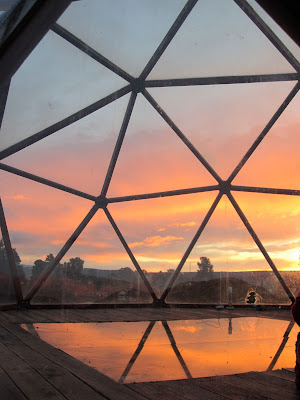I write this from Colonia, Uruguay’s most picturesque and touristed town. From most points here you can see or smell the river, which is really more like an ocean, salty and massive, cargo ships visible on the horizon. I have seen Montevideo, this nation’s capital, whose elegant buildings and canopies of leaves over roads remind me of Buenos Aires. But Montevideo is smaller, walkable, and the river holds more of a presence; it flanks the historic center, which juts out, a peninsula, into this river-sea. The water is slate gray, dirty when you peer into it, but from a distance it is lovely. Close to the river's cemented banks, the buildings in Montevideo get low and old, painted bright colors, windows open. It’s a beautiful city, and Uruguay a beautiful country, with rolling farmland and evenly-spaced plots of eucalyptus. It’s springtime now, and the air smells so sweet—it’s the fragrance of the flowering trees, whose blooms resemble lilacs and whose trunks are fat like sycamores.
Uruguay is the tenth country I’ve seen this year. It is impossible, in this rented room by the water, to fathom how far I have come, how many miles I have travelled, how many beds I have slept in, as Jhumpa Lahiri put it. Over time the borders in my mind have blended, the landscapes too, and so now when I dream of the flat expanses of the Andean sierra, I do not know whether I’m seeing Bolivia, or Peru, or the southern part of Ecuador. Does it matter, anyway? The hippy girl I met in Cordoba, the Irish one with the dreadlocks and the vials of oils, told me she thought borders were pointless, and ever since then, I've pondered. Uruguay feels richer, though the slums still crumble away at the edges of the cities, and bent-over women still crouch, working, in the fields. Here, everyone walks around, or drives or sits on the curb, with mate in their hands, sipping the hot tea slowly and smoking. Why here and not there? Why bright colors, woven patterns, there and not here? Borders—those slippery, shifting crossings.
How far I feel from the Cordoba province, where I spent the last two weeks, where even the nights were warm and in the daytime the sun blazed, beating down on the city's even sidewalks and the leafy, tree-lined avenues, beating down on the scorched parks and the stately museums. How far I feel from the little towns that surround that gleaming place—Capilla del Monte, where I travelled with the Irish girl and her two Belgian friends, mother and daughter who now live in Tahiti. That little town, where we slept in a big old house with a whitewashed roof and a view of the hills all around, not yet green. In the night, the wind there smelled like perfume, rustling the dark and invisible trees and making all the street dogs bark.
There was Mina Clavera, that small city known best for its deep, clear pools that the boulders in the winding river form. There was the Scottish man with the impeccable Spanish who came to Argentina six years ago with a backpack and never left. He found a wife and now, he told me in a whisper, they are expecting. He smiled modestly as I cried out and hugged him. There were the two sleek cats, the fat frogs that hopped out at dusk, and always the river, the color of amber, that divided the town. There was Nono, the tiny puebla with the strange and massive museum, which held everything from human skulls to dolls, from crucifixes to old record players, from dishes and teacups and dozens and dozens of spoons, to seashells mounted on the walls. There were the buses in the evening filled with children; there was the old man who sold sausages and who picked me up when I stuck out my thumb and drove me home. Seventy-five! He’d said of his age, smacking his head with his hand. Seventy-five! But he didn’t look it.
Aofie, the Irish girl was called. She rolled her own cigarettes and smelled like lavender and something else, something earthy and smoky. She looked so much like a friend I had in college, a friend who twisted her hair into dreadlocks our first year and walked around in baggy pants, that I felt like I knew her, this Aofie, after just a few hours. Don’t count the days you have left, she’d said. Don’t count. Just feel. She warned me not to let the kernel of wild freedom I’ve found get lost in the shuffle, after I fly away. That night, a group of travelers came in from Buenos Aires; they sat in a circle, singing, their voices round and strong, their eyes wide open.
You look different, Gaby said. Gaby, the one I met in Cusco, the one whose email address I lost. The one I bumped into the other day in the Cordoba market. After a few beers, a few laughs, a few exclamations of disbelief - one turn and we would have missed each other! - she told me that my face looked different, my hair. You're darker and lighter both, she said. And the way you walk - it's different. You seem like you belong.
*
To the west, the wind sings through Capilla del Monte, through Mina Clavera, through all the little towns I’ve seen and all the others I have not. It rolls up and down this continent, through all these wild and spectacular countries, and it seeps inside me, warming my blood. I want it to stay right there forever, this wind, this place, these cities and towns and hills that are blending together now. They come in the night, sneaking into my dreams, and when I'm awake I can feel them, tattoos on my skin that might fade as the years go by, but will never fully leave me.
(mate!)






















